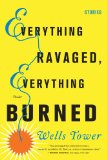Summary | Excerpt | Reviews | Beyond the book | Read-Alikes | Genres & Themes | Author Bio

Stories
by Wells TowerHe opened the refrigerator, which was empty and breathed out a sour-thermos smell. Shrunken ice cubes lay in trays in the freezer, and Bob popped one out and stuck it in his mouth. It tasted like old laundry. He spat it into the dusty cranny between the fridge and the stove.
That passage appears at the end of the second paragraph of the first story in Everything Ravaged, Everything Burned, and it was at this point that I decided I was going to like Wells Tower's book. Sour thermos fridge. Old laundry ice cubes. That frightening no-man's-land down the side of the stove! Genius.
But I was nervous. Still on page one and already sold -- surely I was setting myself up for disappointment. Could the next 235 pages possibly follow through on the promise of the first? Would there be heart and meaning beyond the metaphors? I read on, and found that Bob -- the man who eats the old laundry ice cube -- is staying alone in his uncle's dilapidated beach house. A month before, Bob and his wife were driving together, when she "looked up and saw the phantom outline of a woman's footprint on the windshield over the glove box. She slipped her sandal off, saw that the print did not match her own, and told Bob that he was no longer welcome in their home."
That's when I decided I loved Wells Tower's book and continued to turn the pages, marking them up with glee. Which is not to say that the stories themselves are gleeful -- far from it. The pleasure is in Tower's language, his dead-on, completely original metaphors that render his characters and their world instantly familiar and real. He describes one character as "nearly all cheek, with small, crooked features that looked like they'd been stuck on in a hurry." Another laments for his hypothetical progeny, terrified that "by the time our little one could tie his shoes, his father would be a florid fifty-year-old who would suck the innocence and joy from his child as greedily as a desert wanderer savaging a found orange." In Executors of Important Energies, Towers describes a depressed, one-time trophy wife's house, "where all the sunlight in the place would not have been enough to run a solar calculator," and her stepson's apartment as "the architectural equivalent of a biscuit dough remnant."
Although Tower writes with the specificity and razor-sharp
observations of a poet, his metaphors go down easy, coated in the sugar of a writer
at ease with his craft. Not so for many new, talented, but trying-too-hard writers
whose manufactured constructions still have the lingering scent of writing school
exercises about them.
These are mostly stories of men -- broken, desperate, aged-out
men who've cashed in all of their chips, but refuse to fold their last hand, even
thought it's surely a bust. They're giving it one last go, but there is no swan
song, just a sad refrain. Still, Towers steels them all with a measure of defiance,
some furious, long-tamped passion that bubbles to the surface and fills them with
a rage they used to know as desire.
Retreat dives into the violently contentious
relationship between two grown brothers ("I carry a little imp inside me whose
ambrosia is my brother's wrath"), one high on desperate fantasy, the other resigned
to his miserable existence. Wild America, the lone story featuring two teenage
girls, is ultimately about the sad-sack father who seals his daughter's awkwardness
with his "uncomprehending fat-boy's smile... a curse of pinkness and squatness and
cureless vulnerability that was Jacey's right alone to keep hidden from the world."
The title story, the one about Viking marauders, is the real surprise of the collection
-- a strangely funny, bloody experiment that ends up being about the terrible conundrum
of love, family, and the accompanying terror of responsibility: "I got an understanding
of how terrible love can be. You wish you hated those people, your wife and children,
because you know the things the world will do to them, because you have done some of those
things yourself."
Some writers are simply masters of the short story, writers
like Raymond Carver or Amy Hempel, whose genius blossoms from the limits of the
form, much like poets. Wells Tower is not one of these; he's simply a great writer
who happens to be writing great short stories right now. Everything Ravaged, Everything
Burned makes me hunger for his first novel.
![]() This review was originally published in The BookBrowse Review in April 2009, and has been updated for the
February 2010 edition.
Click here to go to this issue.
This review was originally published in The BookBrowse Review in April 2009, and has been updated for the
February 2010 edition.
Click here to go to this issue.

If you liked Everything Ravaged, Everything Burned, try these:

The Largesse of the Sea Maiden
by Denis Johnson
Published 2019
Twenty-five years after Jesus' Son, a haunting new collection of short stories on aging, mortality, and transcendence, from National Book Award winner and two-time Pulitzer Prize finalist Denis Johnson

by Kay Ryan
Published 2011
A major event in American poetry: The poet’s own selection of more than two hundred poems, offering both longtime followers and new readers a stunning retrospective of her earlier work as well as a generous selection of powerful new poems.
Your guide toexceptional books
BookBrowse seeks out and recommends the best in contemporary fiction and nonfiction—books that not only engage and entertain but also deepen our understanding of ourselves and the world around us.